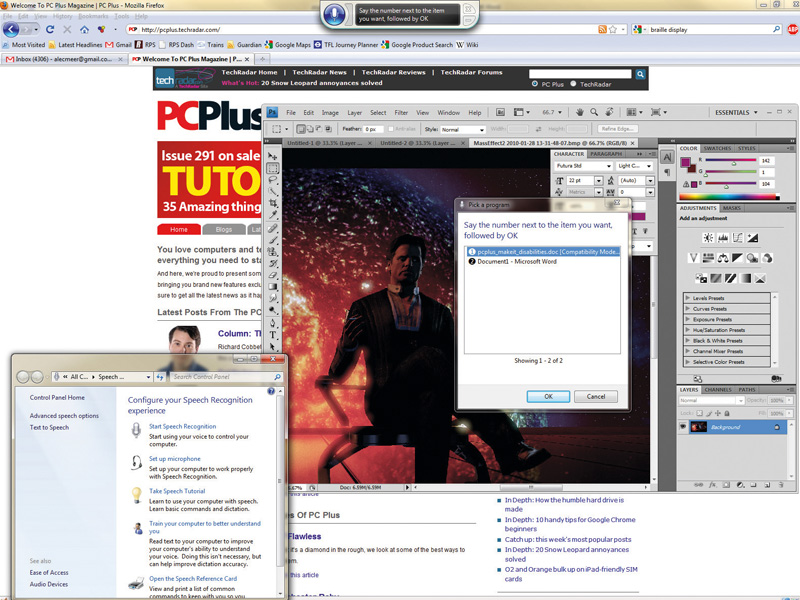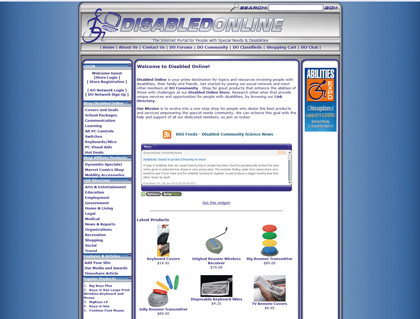
The internet has become a fundamental part of our daily lives – a rich source of facts, discussion, fun and community that's home to an infinite number of ways to share thoughts and kill boredom.
There are, of course, many opportunities to achieve this in the open world too – but that's not quite so easy for a lot of folk. For many disabled and special-needs people, the internet has proven to be truly life-changing.
"It's opened up a world that would otherwise not exist," says Jay Cohen, founder and manager of www.disabledonline.com, a global online community comprising forums, blogs, links, resources and a store of assistive technology.
Cohen suffers from muscular dystrophy, rendering him unable to use a keyboard. Nonetheless, he's been running this busy site since launching it as a message board in 2004.

ONLINE COMMUNITY: Disabled Online started as a message board in 2004 and has gone from strength to strength
"To have an opportunity to communicate with others, research information and find entertainment, all from the comfort of your home, makes the internet a true blessing for those with physical limitations," he explains.
A real boost
Get daily insight, inspiration and deals in your inbox
Sign up for breaking news, reviews, opinion, top tech deals, and more.
Alex Barker runs and works on the Advice and Information Line for AbilityNet, a charity that provides technological help and assistance to any of the UK's 9.8 million disabled citizens who want it.
"People with disabilities have found the internet a real boost because it helps to make life easier by providing online access to services such as banking and food shopping, and also gives them the ability to network with other people who are in the same situation as themselves," he says. "Isolation can be an issue, but the advent of support groups means people can join an online community from the comfort of their own home."
AbilityNet is funded by grants and donations, and by charging for some services in order to generate the money necessary to provide advice and assistance for free. It also has links with some of the tech industry's biggest names. "Both Microsoft and IBM support us in terms of giving us office space and so on," explains Barker.
In fact, the charity was born out of IBM in the 1980s, when the company noticed a small group of its employees providing assistance to disabled users and elected to provide start-up funding for a dedicated organisation in that vein. In 2008, AbilityNet was able to directly assist 43,724 people in overcoming their accessibility issues with computers – largely through its free phone and email support lines.
Particularly successful lately is the charity's new wiki, which is known as AbilityNet GATE (Global Assistive Technology Encyclopaedia) and can be found here. AbilityNet GATE can be added to and updated by anyone with anything to share about accessible computer use.

MALTRON: This device is designed to be mounted vertically and operated with a head wand or mouth stick
AbilityNet's work with the IT world itself is just as important as the many ways it goes about providing information to its users. "I think AbilityNet as an organisation has tried to make people more aware of what is good practice in terms of the provision of IT, and hopefully we've managed to change the perceptions that people have of disability," says Barker.
"A computer makes it so easy for someone with a disability to work at the same speed as their peers. I work on the Advice and Information Line and it's so rewarding helping someone change their settings on their computer to make it easier for them to work effectively."
That change in perception is key – the internet is a great leveller, providing the same potential to absolutely everyone. "The internet has made accessing information so much easier, so even if you don't have the physical ability to go and find the information, you can probably find it online."
As well as information, the internet gives users the option to remain anonymous. Does the fact that other internet users don't immediately know they're chatting to someone with a disability mean they act in a way they otherwise wouldn't?
"It may play a factor in certain situations," thinks Cohen. "I suppose it all depends on the circumstance. I have been on social networks and chatrooms where I didn't disclose my disability – only because I felt there wasn't a need. Sometimes I would share this, other times I wouldn't. The usual reaction is indifference, although there has been the occasional surprise and curiosity reaction. You really have to take it all in your stride [and remember that] most of the time you are dealing with a complete stranger."
While there are a great many services and communities dedicated specifically to disabled and special-needs internet users, it's a mistake to think such folk are behaving differently to anyone else online.
"We mostly try to keep an open discussion," says Jay in regard to DisabledOnline's forums. "We want our members to have the ability to voice whatever is on their minds, as long as it's respectful to others. We aren't looking for any specific agendas in our chatrooms: it's an open forum and we plan on keeping it that way."
Neither is there a huge centralised online community available for disabled people, explains Cohen: "I think it's just like any other segment of the population. Sometimes they get bored at one spot, so they visit another. Then they come back after a while. The community is growing, so with that more options arise."
And the web also offers the opportunity for easy and fluent discussion across international borders, something that can otherwise be very tricky for people with limited mobility. "I believe it's helped unite the community by bringing together voices from all over the world. We have members not only from the US and UK, but from India, New Zealand, South Africa and other countries. We are truly a worldwide community."